Before Claudine Gay retroactively corrected her plagiarized PhD thesis... there was Terrell Strayhorn
Terrell Strayhorn (He/Him) is a professor of education at Virginia Union University, following a career bouncing around Illinois State University, LeMoyne-Owen College, The Ohio State University, and the University of Tennessee.
He was actually tenured at Ohio State for over 7 years - a great school!
OSU is ranked 43rd among National Universities.
So, what prompted his major downgrade from Ohio State to LeMoyne-Owen College in 2018?
LeMoyne-Owen College is not even ranked and has a 98% acceptance rate for undergrads.
Of course, there are always idiosyncratic preferences and family reasons for moving to lower schools, but in general, no rational tenured professor would voluntarily accept such a major downgrade in status and salary.
The answer is that Strayhorn was ‘’ousted’’ from Ohio State in 2017 over financial misconduct.
University documents … reveal that OSU decided to fire Strayhorn as CHEE director following a university audit that revealed that Strayhorn was engaged in too many speaking engagements and other appearances made in his capacity as CHEE director.
…
As a result of his failure to comply with OSU policy, the university decided to terminate his position as CHEE director in March and review his compliance with university policies as a faculty member.
In An Open Letter to Create Closure: Why I Left Ohio State, Strayhorn maintains he didn’t get fired… he quit:
I am not here to write on Strayhor’s downfall from OSU—that’s old news—already widely reported at the time.
Instead, I aim to explore the events that unfolded afterward.
In the immediate aftermath of being ousted from Ohio State, Strayhorn sought employment at North Carolina State. This attempted move sparked a significant backlash from the faculty there. According to a 2018 article in Inside Higher Ed article, an anonymous group of North Carolina State professors expressed their disapproval of his candidacy, citing ethical concerns and stating they were "ashamed and embarrassed that he was even brought to campus for an interview."
A group of anonymous professors at North Carolina State University want to know why Terrell Strayhorn is a finalist for an education faculty position there even after he was fired from a center directorship at Ohio State University last year over financial misconduct.
“Strayhorn used his faculty position at Ohio State to enrich himself by over $100,000 a year, using state employees to schedule and book his private business engagements,” reads a letter sent to the North Carolina Legislature, the University of North Carolina System's Board of Governors and news media Tuesday evening. The letter’s authors identify themselves only as “Faculty of the [North Carolina State] College of Education Opposed to Hiring Criminals and Sexual Harassers.”
Here is the new aspect of this story that was never reported on:
Around the same time, in 2018, a document detailing significant plagiarism accusations against Strayhorn circulated among education professors — academia is a small world, and this was shared widely. I don’t believe this document originated from North Carolina State, but elsewhere.
The main thing this document shows is that large swaths of Strayhorn’s 2005 doctoral thesis are copy-pasted straight from the work of Laura W. Perna, a provost at UPenn who works in the same field.
Here are just a few examples; the entire document is 10 pages long:
I emailed Dr. Perna to ask how she felt about her work being copy-pasted without citation.
No reply.
I emailed Strayhorn for comment.
No reply.
When Virginia Tech, Strayhorn’s PhD-granting institution, was informed of the plagiarism, rather than revoke Strayhorn’s dissertation, they retroactively revised it to ‘‘address minor paraphrasing issues and inadequate citations’’:
Of course, this is exactly what Harvard did with Claudine Gay’s thesis. “President Gay will update her dissertation correcting these instances of inadequate citation,” said Harvard.
This is the beautiful thing about plagiarism, all you need to do is insert a few quotation marks and citations -- voila! The plagiarism is cured! It is a miracle! Pick up your mat and walk!
Jesus said to him, “Rise, take up your mat, and walk.”
Immediately the man became well, took up his mat, and walked.
—John 5:8
Before these two instances of retroactive corrections to theses, I had never heard of this happening before. I spoke to one professor who said he had seen a thesis retroactively corrected before, but he was unable to point to any specific instances. If you know of a thesis being retroactively corrected, please link to it in the comments:
Of course, since the only 2 instances of plagiarism being swept under the rug in this manner are black CRT scholars, people will immediately point to their immutable characteristics and political leanings as the reason they got off so lightly. This argument might have merit, but I would argue that, in reality, universities have a strong aversion to scandals of any kind and typically opt to conceal them, regardless of who is involved.
What is Virginia Tech going to do, upon being notified: issue a press release?
Or quietly correct his thesis and hope nobody notices?
The real impact of intersectional privilege becomes evident in the consequences—or lack thereof—that follows the revelation of misconduct. Instead of facing termination, he was permitted to resign from Ohio State, subsequently continuing his esteemed career without apparent impediment.
One can't help but speculate on the starkly different trajectory likely faced by a white conservative male found guilty of similar transgressions—financial misconduct and a plagiarized thesis—a scenario in which re-entry into the academic sphere would seem virtually impossible.
Additional Fraud: Strayhorn’s Law Degree
For years, Strayhorn advertised himself as a ‘‘law student’’, but when you check his CV, it is not a ‘‘law degree’’, instead it is a one-year masters in the study of law… which he never completed.
Nonetheless, he listed it on his CV as a degree obtained.
A university spokesperson said that Ohio State had additional concerns about Strayhorn promoting himself as holding an M.S.L. degree in an academic bio and in his promotion process to full professor. Strayhorn had previously been enrolled in a master of law program at Ohio State, he said, but did not finish.
Additional Fraud: Embellishing publications
For years Strayhorn has been bragging about 200+ refereed publications:
He has published more than 200 refereed journal articles & book chapters and more than 150 papers at international and national conferences.
— Strayhorn’s Amazon author profile
Author of 12 books and over 200 peer-reviewed journal articles and academic publications
Strayhorn has authored 12 books … and over 200+ peer-reviewed journal articles and academic publications
Strayhorn has authored … and over 200 peer-reviewed journal articles and academic publications
Strayhorn has authored … over 200+ peer-reviewed journal articles and academic publications
He has authored … more than 200 academic publications in highly-regarded peer-reviewed journals and volumes, plus dozens of widely-circulated op-eds, letters, and blogs
— New England Association of Collegiate Registrars and Admissions Officers
When he was hired at Virginia Union University in 2023, the wording changed to be slightly more ambiguous, highlighting that his 200+ publications may include policy reports and op-eds: ‘‘Strayhorn has published over 200 peer-reviewed articles in top-ranked journals and nationally circulated policy reports, technical briefs, and op-eds.’’
Furthermore, his personal website no longer refers 200+ peer-reviewed articles, but instead, simply 200+ scholarly publications, which is much broader:
A 2024 speaking engagement, however, is less ambiguous: it explicitly states that he has authored over 200+ peer-reviewed journal articles.
Strayhorn has authored 12 books … and over 200+ peer-reviewed journal articles and academic publications.
— Lebanon Valley College, SYMPOSIUM ON INCLUSIVE EXCELLENCE 2024
So, how many peer-reviewed articles does he have?
Is it over 200+, as he constantly claims online?
These 200+ publications should be easy to verify on his CV, right?
But he no longer lists his CV online.
Oh.
Weird.
Why not?
Luckily, I’ve obtained an exclusive copy of his CV from 2014.
It lists:
12 Books, Monographs, & Edited Volumes
43 Book Chapters
12 of these are chapters in books he wrote.. lmao… so he lists the books, and then he lists the chapters in each book as additional publications, double-counting them.
69 Refereed Journal Articles and Abstracts
6 have gone offline
1 is just an abstract
1 is published in the non-peer-reviewed ‘‘News and Views’’ section of a journal
1 is an introduction to his book
1 is an introduction in the ‘‘editors note’’ section
5 are blurbs in newsletters
19 Refereed Papers in Conference Proceedings
14 Technical Reports and White Papers
7 book reviews
18 Editor-Reviewed Publications
These are all 1-page blurbs in newsletters, lol
2 Instructional Materials
These are just powerpoint presentations, lol!
2 Research Fellowship Reports
These add up to 186 publications on his CV.
But once we remove:
powerpoints
double-counted book chapters
non-peer-reviewed policy/technical papers
newsletters
abstracts
introductions
non-peer-reviewed ‘‘news and views’’ section
books
Remember he always lists his books IN ADDITION to his 200+ publications
book reviews & conference proceedings
Remember, on Amazon, he delineated the ‘‘200 refereed journal articles & book chapters’’ from the ‘‘150 papers at international and national conferences’’ — so by his own categorization, conference proceedings don’t count in the supposed 200+ total that he brags about.
If we are conservative and include the 6 publications that have gone offline, we are left with 31 book chapters + 60 publications, for a total of 91 ‘‘refereed journal articles and book chapters’’, a far cry from the 200 that he claims.
But this total of 91 comes from his 2014 CV.
To update it to 2024, since he doesn’t list any new CV online, the only way is by using his Google Scholar which lists 163 total publications.
Roughly 30 of those Google Scholar publications are from 2015-2023.
So, if we add those 30 recent publications to the 91 on his old CV, we can estimate that today he has approximately 121 refereed journal articles and book chapters.
I might have miscounted by a few — it’s hard to comb through hundreds of bullshit publications on Google Scholar and discern which ones are peer-reviewed vs. book chapters vs. policy reports vs. newsletter blurbs — if I did miscount, I would be more than happy to correct this article.
Dr. Strayhorn, if you are reading this, please send me an updated CV that shows your 200 refereed journal articles & book chapters that you claim to have, and I will happily issue a correction: chrisbrunet@protonmail.com
So what if this guy is a fraud?
What does it mean if an individual like Terrell Strayhorn is unveiled as a fraud?
His story—a narrative punctuated by plagiarism, financial misconduct, and an inflated CV that, even in its most honest form, offers little more than low-IQ rambling on DEI—might seem like just another tale of personal fallibility. However, focusing solely on Strayhorn misses the broader, more critical issue at hand.
Strayhorn's journey from academic disgrace to his current moonlighting as President/CEO of Do Good Work Consulting Group, a consulting firm that charges institutions hefty fees for lectures on DEI, isn't just a story of individual misconduct. It's symptomatic of a deeper malaise within the academic world and beyond.
This scenario reveals a larger, more troubling reality: the DEI-industrial complex has evolved into a lucrative venture for intellectual lightweights, exploiting noble ideals for personal gain. It's a world where intellectual depth and integrity often give way to superficiality and opportunism, run by liars more interested in self-enrichment than in meaningful change. In shedding light on figures like Strayhorn, we're compelled to confront not just the individuals but the systemic rot they embody—an environment that allows, and perhaps even encourages, such exploitation to thrive.




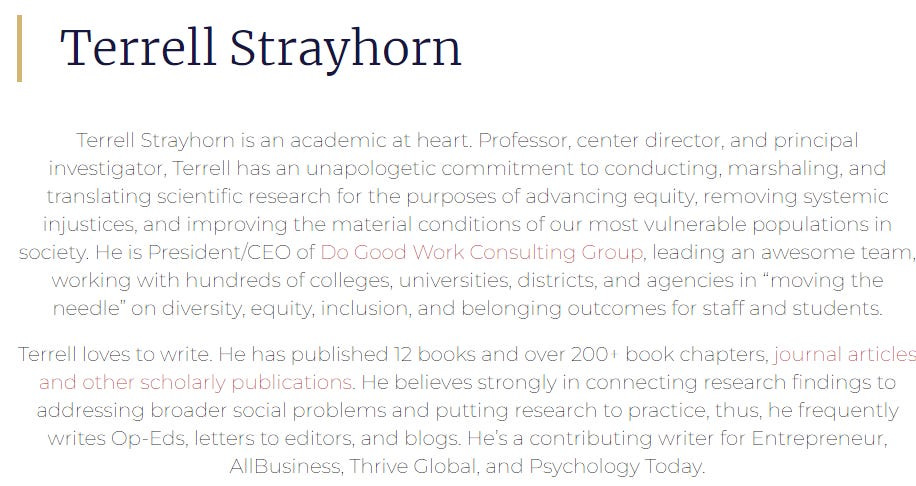
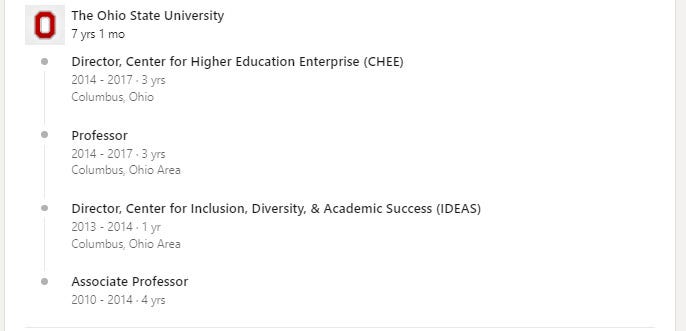
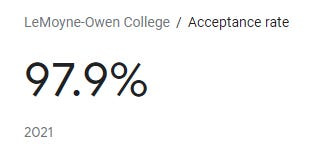

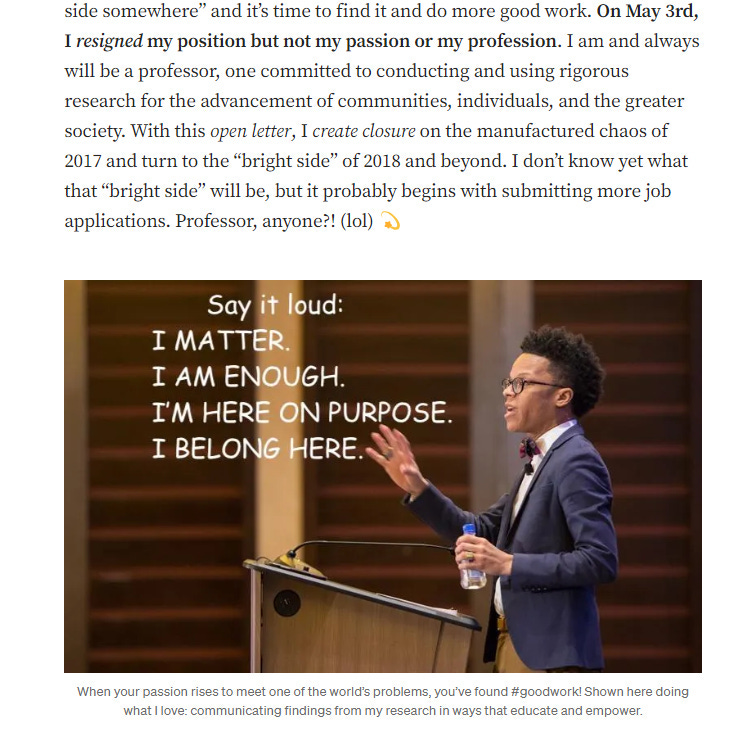



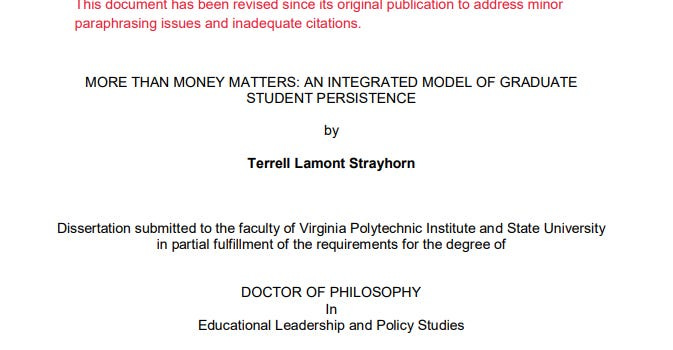





Among the more important tragedies here for education are the kids who sacrifice time and sleep and money to get an education because they really do want one, and encounter a puffed-up moron like this and become either discouraged at the mediocrity found in their institutions, or, because of their limited exposure to good teaching, think this guy has something useful to impart.
A really good teacher/mentor can save someone worth saving. A bad one of course...
" the DEI-industrial complex has evolved into a lucrative venture for intellectual lightweights, exploiting noble ideals for personal gain. "
The only thing I would disagree with is "has evolved into" as opposed to "pretty much always was." Once there stopped being consequences the sky was the limit, and this sort of nonsense has even fewer consequences than most bs companies. You don't even have to produce a product, because the product is "fancy people telling you your ideology is correct."